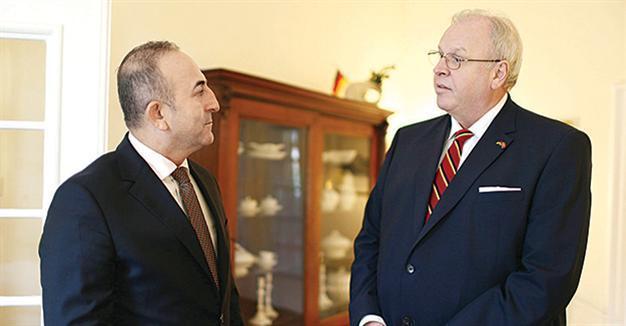Germany: Turkey righteous in fight against PKK, but solution is on political ground
Emine Kart - ANKARA

German Ambassador to Turkey Martin Erdmann has voiced Berlin’s unconditional support to Ankara’s ongoing fight against the outlawed Kurdistan workers’ Party (PKK), while underlining that “a final and permanent solution” to the Kurdish issue could only be found on political grounds.
“Fighting against the PKK and defending itself against the PKK is Turkey’s most natural right. However, according to the German federal government’s conviction, this problem can reach a final and permanent result only on a political platform,” Erdmann told journalists on Jan. 19.
“We supported the resolution policy that the Turkish government applied after 2013 and we have been very saddened that this has been interrupted since last July,” he added, referring to the fact that violence between the security forces and Kurdish militants reignited in summer 2015, shattering a fragile peace process and two-and-a-half-year de facto ceasefire.
Erdmann’s remarks came days before an intergovernmental consultation meeting between Germany and Turkey, which will be held in Berlin on Jan. 22. The first of its kind, the meeting will be co-chaired by Turkish Prime Minister Ahmet Davutoğlu and German Chancellor Angela Merkel.
The German ambassador said Davutoğlu and Merkel had actually decided to hold such meetings a while ago, but it was delayed due to Turkey’s hectic agenda in 2015, when the country was preoccupied by two consecutive parliamentary elections. He strictly ruled out suggestions that the refugee crisis encouraged German officials to accelerate plans for such a meeting.
Erdmann also refused to comment on Turkish Deputy Prime Minister Mehmet Şimşek’s remarks, published in German daily Die Welt over the weekend, in which he said Germany must step up its involvement in Syria if it wants to stem the flow of refugees into Europe.
Noting that German Defense Minister Ursula von der Leyen will meet her Turkish counterpart İsmet Yılmaz on Jan. 20 during a visit to the İncirlik Air Base, from where Germany has started flying reconnaissance Tornado warplanes over territory held by the Islamic State of Iraq and the Levant (ISIL) in Syria, Erdmann stressed that Germany and the EU do not intend to “lay the entire refugee burden on Turkey’s shoulders.”
“As the EU and Turkey, we need joint management of this refugee influx. The Turkish government’s decision to impose visa requirements for Syrians coming from third countries was the right decision. We would also welcome Turkey’s imposition of visa requirements for some Africa countries. We believe we can take the phenomenon of ‘irregular migration’ under through these kinds of measures. But nobody wants to lay this whole problem on the shoulders of Turkey. We can overcome this difficult matter through cooperation,” Erdmann said.
Ankara recently reversed a six-year agreement that grants Syrian citizens visa-free entry to Turkey, while Syrians arriving in Turkey by air and sea from other countries also need visas as of Jan. 8, 2016.
The visa restrictions won’t apply to Syrian refugees who cross the Syrian-Turkish border by land to flee the conflict in Syria, but the move aims to stop Syrians flying into Turkey from other countries and illegally trying to reach Greece and other European nations.
An official statement released on Jan. 9 by the Turkish Foreign Ministry categorically denied press reports that Turkey would reintroduce visa requirements for 89 countries as of June 1.
“The negotiations with the EU to ensure Schengen visa exemption for our citizens are ongoing. Full alignment of our visa policy with the EU vis-à-vis third countries is an obligation we must fulfill following Turkey’s full membership to the EU. Therefore, at this stage the news about Turkey’s plans on the introduction of visa requirements as of June 1 vis-à-vis countries required to obtain EU visas do not reflect reality,” stated the ministry.
 German Ambassador to Turkey Martin Erdmann has voiced Berlin’s unconditional support to Ankara’s ongoing fight against the outlawed Kurdistan workers’ Party (PKK), while underlining that “a final and permanent solution” to the Kurdish issue could only be found on political grounds.
German Ambassador to Turkey Martin Erdmann has voiced Berlin’s unconditional support to Ankara’s ongoing fight against the outlawed Kurdistan workers’ Party (PKK), while underlining that “a final and permanent solution” to the Kurdish issue could only be found on political grounds.